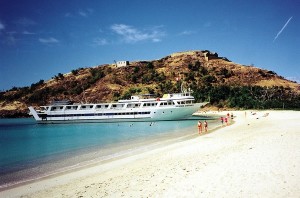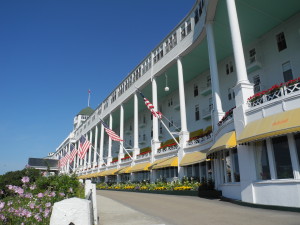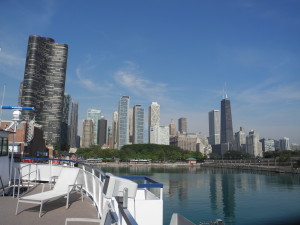
The Grande Mariner also ventures to Central America and the Caribbean. Photo from Blount Small Ship Adventures.
Sixth in a Series
When it comes to cruising, you can usually divide people into two camps: those who like big ships and those who like small ships.
On our recent “Magical Lake Michigan” cruise with Blount Small Ship Adventures, I don’t know how many times I heard other passengers say they would never take a big ship cruise.
The notion of traveling on a floating city of 2,000-6,000 people just didn’t interest them.
Small Ships Vs. Large
Cruising on a small ship — usually defined as one carrying 200 or fewer passengers (though often far less) — does have plenty of advantages:
* Getting on and off the ship takes virtually no time, while on a big ship, you often have to wait in long lines to do either.
* Small ships can dock or anchor off little, out-of-the-way ports that the big ships can’t reach (such as remote Beaver Island on our Lake Michigan cruise).
* With fewer passengers aboard, you (perhaps ironically) have a better chance of getting to know more of your fellow passengers.

The Grand Hotel on Mackinac Island is one of the best photo ops on the Lake Michigan cruise. Photo by Catharine Norton
Of course, big ships also have their advantages:
* Due to economies of scale, they are often less expensive than small ships.
* They offer a greater variety — often far greater variety — in dining places, entertainment, activities, and cabin types (including much larger cabins than on many small ships).
* With typically greater stability, big ships may encounter less wave motion that can lead to seasickness.
As for me, I can go either way, as long as I’m on water. I’ve experienced both big and small-ship cruises a number of times, and know the appeal of each. Maybe that’s why one of my favorite cruise lines, Oceania, has mostly medium-sized ships — a nice compromise.
The Blount Approach
Blount operates two ships: the Grande Mariner, which my wife, Catharine, and I took on Lake Michigan, and the Grande Caribe.
Each carries a maximum of 88 passengers. The two ships travel throughout the waterways of North America, primarily in the U.S. but also in Canada, Central America and the Caribbean.
They are able to navigate shallow waters and, as their slogan goes, “To Go Where the Big Ships Cannot.”
It’s one of the few cruise lines to regularly sail Lake Michigan, running four of these cruises this summer.
Our cruise began and ended in Chicago, Illinois, with plenty of time on both ends to explore the Windy City.
In between, we visited Holland, Beaver Island, and Mackinac Island, Michigan; and Sturgeon Bay and Milwaukee, Wisconsin (a scheduled stop in Manitowoc had to be skipped due to impending storms there).
Besides the ports and the people we met, here are some of the things I liked about the cruise:
* The food was generally ample and very good. Dinners usually began with a salad followed by a main course with choice of meat or seafood, then dessert. Lunches were often soup and sandwiches (one day there was a barbecue on deck), while breakfasts combined a buffet with platters of eggs and other items served family style. Complimentary wine or beer were served with lunch and dinner.
* There was open seating in the dining room. While meals were served at set times, you could sit with whomever you pleased.
* Dress was informal throughout.
* Happy hour, which started an hour before dinner, was BYOB (saving lots of money on having to buy overpriced drinks), with the ship’s crew providing set-ups, mixers, and condiments in the lounge. Twice during the week there was an open bar at happy hour, accompanied by appetizers such as cold shrimp and scallops wrapped with bacon.
* The captain kept announcements to a minimum, but when he spoke, people listened, offering good insights into ports we had just visited, were soon to visit, or about the lake itself.
* The upper deck was completely open air with a number of tables located under a shade canopy and other seating in the sun.
This is not a luxury cruise: the cabins are small (pack light) and hot water is scarce enough that you have to take “Navy showers,” turning down the water flow while you soap up.
There’s no TV and entertainment is low key: some lectures about the lake by a local expert and, on one evening, a musical story-telling presentation. On other evenings, films (both old and new) were shown in the lounge.
But if you like to go where the big ships cannot, relax on deck or in the lounge in a calm, quiet atmosphere, and see a part of the country — one of the five Great Lakes that are “unsalted and shark free” — I can highly recommend this cruise.
Readers: You can subscribe to my blog and get notification of every post by simply typing in your email address and clicking on the blue Subscribe button or downloading my free report, How to Ride the Coming Wave of Boomers. Thanks!













Leave a Reply